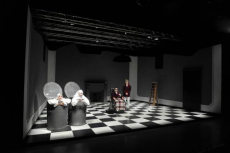
Email: reecejordan98@hotmail.co.uk
Total Article : 168
About Me:18-year-old sixth form student, studying English Literature, History and Government and Politics. My articles will broadly cover topics from the current affairs of politics to reviews of books and albums, as well as adding my own creative pieces, whether it be short fiction or general opinion.

To entertain the interpretation of Hamm as Hamlet shows most vividly the pre-emptive style of Beckett. Besides Hamm and Hamlet only sharing tenuous character parallels, Hamm’s cry of ‘My kingdom for a nightman!’ invokes another of Shakespeare’s characters, Richard III. The connotative potential has shifted from Hamlet to Richard (a ‘readjustment’ from the audience) but to have this shift within the same oeuvre, Shakespeare’s, suggests that Beckett was aware of the audience’s interpretation of Hamm as Hamlet and is now playfully testing to see if the bait will be taken a second time, further obscuring the coherence of the play. This is perhaps a subtle critique of the gravity given to names in fiction, the negligible amount of meaning they can emit, and the futility of deriving meaning from such insubstantiality within a play.
Beckett also forestalls any grounded interpretation by creating nonsensical rationale within the play. When Hamm asks Clov why he doesn’t kill him, Clov responds that he doesn’t ‘know the combination of the larder’. At first this might seem perfectly rational, especially with the rapidity of a performance to a live audience – Clov is reliant on Hamm for food to survive. But this rationale is soon rendered nonsensical when we realise that Hamm cannot move nor see, and so is reliant on Clov to open the larder to bring him food. Thus, it might be that Clov is lying and he does not kill Hamm out of compassion or solidarity. But this interpretation is again destabilised in Hamm’s lack of response to the supposed lie – the dialogue continues as if Clov had given a satisfactory answer. Here, again, Beckett lures the audience into believing that the play is starting to cohere, or at least make some sort of sense, only to frustrate them afterwards. ‘Endgame’ suggests a progression towards an end, something which brings closure. This frequent frustration of closure, of meaning, highlights the play’s illusion of progression. In response to Hamm’s ‘anguished’ question of ‘what’s happening, what’s happening?’, Clov replies, ‘something is taking its course,’ which echoes the repeated phrase ‘We’re getting on.’ (9/12/25) Fletcher and Spurling point out that, ‘the theatrical language of Beckett’s plays is that of a man talking to himself, in the first place the author, and in the second place each individual member of the audience.’ Thus, we may posit Hamm as the distressed audience member searching for meaning – ‘What’s happening, what’s happening?’ – and Clov as the abating conscience aware of convention, that ‘something is taking is course’, that closure will be realised soon. The repetition of such phrases, though, renders them vacuous, and it soon becomes clear that progression is not occurring.
Image Credits: chessity.com

0 Comment:
Be the first one to comment on this article.